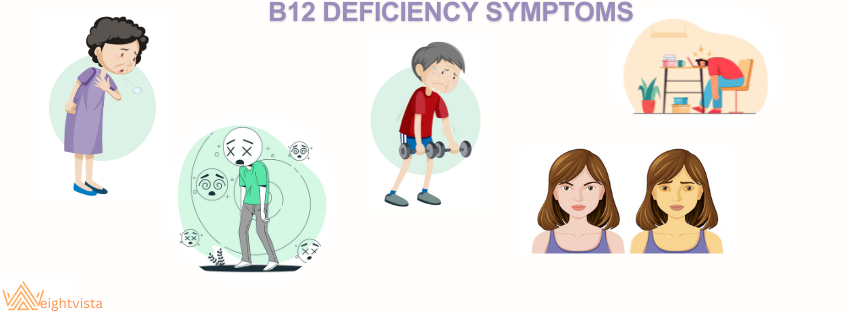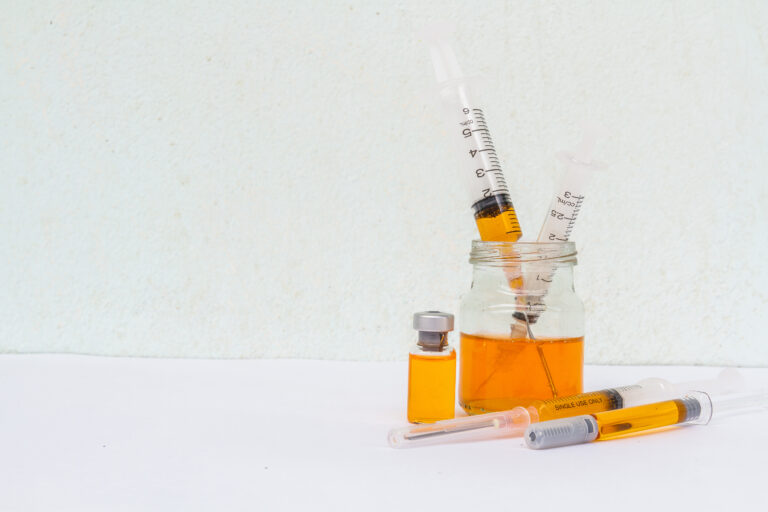In the ever-evolving world of health and wellness, B12 shots have emerged as a topic of interest for those seeking to manage their weight effectively. This comprehensive guide aims to explore the science behind B12 injections and their potential impact on weight management.
Key Takeaways:
- B12 shots may boost metabolism and energy, potentially aiding weight loss efforts.
- These injections can be particularly beneficial for those with B12 deficiency or absorption issues.
- Common forms of B12 used include cyanocobalamin, hydroxocobalamin, and methylcobalamin.
- B12 shots should be part of a comprehensive weight loss plan, including diet and exercise.
- Potential benefits extend beyond weight loss, including improved mood and cognitive function.
- Side effects are generally mild, but medical supervision is crucial.
- B12’s role in hormone balance and metabolic health may contribute to weight management.
- While promising, B12 shots are not a standalone solution for weight loss.
- Consulting a healthcare provider is essential before starting B12 injections for weight loss.
Understanding Vitamin B12 and Its Role in Weight Management
Vitamin B12, also known as cobalamin, is a crucial nutrient that plays a vital role in various bodily functions. This water-soluble vitamin is essential for:
-
- Red blood cell formation
- Nervous system function
- DNA synthesis
- Energy metabolism
While B12 is naturally found in animal products like meat, fish, and dairy, some individuals may have difficulty absorbing it through diet alone. This is where B12 shots come into play, offering a direct route for this vital nutrient to enter the system.
The B12 Weight Loss Connection
The link between B12 and weight loss is multifaceted:
1. Metabolism Boost
B12 is integral to the metabolism of fats and proteins. Optimal B12 levels may enhance the body’s ability to convert food into energy rather than storing it as fat.
Metabolic Pathways Influenced by B12
Cellular Energy Production
B12 plays a crucial role in the citric acid cycle, a key metabolic pathway for energy production at the cellular level.
2. Increased Energy
Fatigue is a common symptom of B12 deficiency. Addressing this deficiency can increase energy levels, potentially leading to more active lifestyles and increased calorie burn.
Signs of Energy Improvement
- Reduced daytime sleepiness
- Increased motivation for physical activity
- Enhanced workout performance
Mitochondrial Function
B12 supports mitochondrial health, the powerhouses of our cells, leading to improved energy production.
3. Improved Mood and Reduced Stress
B12 plays a role in serotonin production, a neurotransmitter that regulates mood. Better mood and reduced stress can lead to healthier eating habits and less emotional eating.
Psychological Benefits of B12
- Decreased symptoms of depression
- Improved cognitive function
- Enhanced stress management
Neurotransmitter Balance
Adequate B12 levels support the balance of crucial neurotransmitters like serotonin, dopamine, and GABA.
The Science Behind Vitamin B12 Shots for Weight Loss
B12 shots deliver a concentrated dose of the vitamin directly into the bloodstream, bypassing the digestive system. This method ensures maximum absorption, especially beneficial for those with absorption issues or strict dietary restrictions.
Types of B12 Shots for Weight Loss
There are several forms of B12 used in injections, each with unique properties:
1. Cyanocobalamin
The most common and stable form of B12.
Benefits of Cyanocobalamin
- Cost-effective
- Long shelf life
- Easily converted to active forms in the body
Conversion Process
The body converts cyanocobalamin to methylcobalamin and adenosylcobalamin, the active forms of B12.
2. Hydroxocobalamin
A natural form of B12 that’s retained in the body longer.
Advantages of Hydroxocobalamin
- Longer-lasting effects
- May be better for certain genetic variations
Detoxification Support
Hydroxocobalamin can bind to cyanide, potentially aiding in detoxification processes.
3. Methylcobalamin
The active form of B12, ready for immediate use by the body.
Benefits of Methylcobalamin
- No conversion needed in the body
- May be more effective for neurological issues
Methylation Support
Methylcobalamin plays a crucial role in methylation processes, important for DNA synthesis and repair.
Who Might Consider B12 Shots for Weight Loss?
B12 injections might be particularly relevant for:
- Vegetarians and vegans
- Individuals over 50
- Those with gastrointestinal disorders
- People with pernicious anaemia
- Individuals on certain medications
However, it’s crucial to consult with a healthcare provider before considering any new treatment regimen.
Identifying B12 Deficiency

- Fatigue
- Weakness
- Shortness of breath
- Dizziness
- Pale or jaundiced skin
Risk Factors for B12 Deficiency
- Age (over 50)
- Digestive disorders (e.g., Crohn’s disease, celiac disease)
- Gastric bypass surgery
- Long-term use of certain medications (e.g., metformin, proton pump inhibitors)
Can vitamin B12 deficiency be a sign of cancer
Although it is not a direct cause of cancer, it may be a sign of some cancers, particularly those affecting the bone marrow or digestive tract. These tumours can inhibit the body’s capacity to absorb or synthesise vitamin B12.
Genetic Factors
Some individuals have genetic variations that affect B12 absorption or metabolism, such as MTHFR mutations.
The B12 Injection Process: What to Expect
For those considering B12 shots, it’s helpful to understand the typical process:
1. Medical Evaluation
A healthcare provider typically assesses the individual’s health history and current status.
Pre-Injection Assessment
- Review of medical history
- Discussion of symptoms and goals
- Blood tests to check current B12 levels
Personalised Treatment Considerations
Based on the assessment, a tailored B12 injection plan may be recommended.
Frequency Determination
The injection frequency is usually determined based on individual needs and B12 levels.
2. Injection Procedure
B12 shots are typically administered intramuscularly, often in the arm or thigh.
Injection Technique
- Sterile preparation of the injection site
- Use of a fine needle for minimal discomfort
- Quick administration of the B12 solution
Post-Injection Care
- Brief observation period
- Instructions for managing potential side effects
Follow-Up Recommendations
Healthcare providers often set up a follow-up schedule to monitor progress and adjust treatment as needed.
3. Typical Frequency
Treatment schedules can vary, but many start with more frequent injections.
Common Injection Schedules
- Initial phase: Weekly injections for 4-6 weeks
- Maintenance phase: Monthly injections or as needed
Adjusting the Schedule
Frequency may be adjusted based on individual response and B12 levels.
Long-Term Considerations
For some, ongoing B12 injections may be necessary to maintain optimal levels.
Potential Side Effects and Safety Considerations
While B12 shots are generally considered safe, it’s important to be aware of potential side effects:
Common Side Effects
- Mild pain or redness at the injection site
- Temporary diarrhoea or upset stomach
- Swelling
- Itching or rash
Managing Common Side Effects
- Applying a cold compress to the injection site
- Staying hydrated
- Gentle exercise to promote circulation
When to Seek Medical Attention
It’s advisable to contact a healthcare provider if experiencing:
- Severe pain or swelling
- Signs of an allergic reaction
- Persistent gastrointestinal issues
Rare Complications
While extremely rare, severe allergic reactions or anaphylaxis can occur. Medical professionals are prepared to manage such emergencies.
Combining B12 Shots with Other Weight Loss Strategies
For optimal results, B12 injections are often considered as part of a comprehensive weight loss plan. Key components may include:
Balanced Nutrition
A nutrient-rich diet supports overall health and weight loss efforts.
Key Dietary Principles
- Emphasise whole foods
- Balance macronutrients
- Practice portion control
Meal Planning Strategies
- Prep meals in advance
- Use the plate method for balanced meals
- Incorporate a variety of colourful fruits and vegetables
Nutrient Timing
Optimising meal timing may support metabolism and energy levels throughout the day.
Regular Physical Activity
Exercise complements B12 supplementation by boosting metabolism and building lean muscle mass.
Types of Exercise
- Cardiovascular activities
- Strength training
- Flexibility exercises
Creating an Exercise Routine
- Start with realistic goals
- Gradually increase intensity and duration
- Find enjoyable activities
Monitoring Progress
Tracking workouts and adjusting as fitness improves can be beneficial.
Stress Management Techniques
Chronic stress can hinder weight loss efforts. Implementing stress-reduction strategies may be helpful.
Stress-Reduction Methods
- Meditation
- Deep breathing exercises
- Yoga
Time Management
Prioritising tasks and creating a balanced schedule may help reduce stress.
Sleep Hygiene
Establishing a consistent sleep routine can support stress management and weight loss.
The Role of B12 in Hormone Balance and Weight Loss
B12 plays a crucial role in hormone balance, which can significantly impact weight management:
Thyroid Function
B12 supports thyroid health, crucial for metabolic regulation.
B12 and Thyroid Hormones
- Aids in the production of thyroid hormones
- Supports the conversion of T4 to active T3
Symptoms of Thyroid Imbalance
- Unexplained weight gain or loss
- Fatigue
- Hair loss
Testing Thyroid Function
Regular thyroid function tests may be recommended alongside B12 level checks.
Cortisol Regulation
Adequate B12 levels may help manage stress-related weight gain.
Cortisol and Weight Gain
- Chronic high cortisol can lead to abdominal fat accumulation
- B12 may help regulate cortisol production
Stress Management Techniques
- Mindfulness practices
- Regular exercise
- Adequate sleep
Monitoring Stress Levels
Keeping a stress diary can help identify triggers and manage cortisol levels.
Insulin Sensitivity
B12 may improve insulin sensitivity, aiding in blood sugar control.
B12 and Glucose Metabolism
- Supports proper insulin function
- May help prevent insulin resistance
Signs of Insulin Resistance
- Difficulty losing weight
- Increased hunger and cravings
- Fatigue after meals
Dietary Considerations
A low-glycemic diet may complement B12 supplementation for better insulin sensitivity.
B12 Shots and Digestive Health
The relationship between B12 and digestive health is bidirectional:
1. Gut Health Impact on B12 Absorption
A healthy gut improves B12 absorption from food sources.
Factors Affecting Absorption
- Presence of intrinsic factor
- Stomach acid levels
- Intestinal health
Improving Gut Health
- Probiotic-rich foods
- Fibre intake
- Avoiding gut irritants
Testing Gut Health
Comprehensive stool analysis may provide insights into B12 absorption capabilities.
2. B12’s Role in Digestive Health
B12 supports the health of the digestive tract lining.
Benefits for Digestive System
- Supports cell regeneration in the gut lining
- May help with nutrient absorption
Symptoms of Digestive B12 Deficiency
- Constipation or diarrhoea
- Loss of appetite
- Glossitis
Supplementation Considerations
For those with digestive issues, B12 shots may bypass absorption difficulties in the gut.
Environmental and Ethical Considerations
As interest in B12 shots for weight loss grows, it’s important to consider broader impacts:
Sustainable Sourcing
The sourcing of B12 for injections is an important consideration.
Types of B12 Sources
- Bacterial fermentation (most common)
- Synthetic production
Environmental Impact
- Energy use in production
- Packaging and transportation
Ethical Considerations
Some B12 supplements are vegan-friendly, an important factor for many consumers.
Reduced Meat Consumption
B12 supplementation can support those choosing to reduce their meat intake for environmental reasons.
Environmental Benefits of Reduced Meat Consumption
- Lower carbon footprint
- Reduced water usage
- Decreased deforestation
Nutritional Considerations
- Ensuring adequate protein intake
- Monitoring iron levels
- Supplementing other key nutrients
For detailed information on weight-related queries, visit https://weightvista.com.
Conclusion: The Role of B12 Shots in Weight Loss
B12 shots represent a potential tool in the complex landscape of weight management. By addressing potential deficiencies, supporting metabolic function, and potentially boosting energy levels, B12 injections may complement other weight loss strategies.
However, it’s crucial to remember that B12 shots are not a magic solution for weight loss. They are most effective when combined with a healthy diet, regular exercise, and overall lifestyle improvements. Always consult with a healthcare professional before starting any new supplement regimen, including B12 shots.
As research continues, our understanding of B12’s role in weight management may evolve. Staying informed about the latest scientific findings can help individuals make educated decisions about their health and weight loss journey.
Frequently asked questions
What are B12 shots and how do they potentially aid in weight loss?
B12 shots are injections of vitamin B12, a water-soluble vitamin crucial for various bodily functions. These injections may aid in weight loss by boosting metabolism and energy levels. Vitamin B12 plays a key role in the metabolism of fats and proteins, potentially enhancing the body’s ability to convert food into energy rather than storing it as fat. Additionally, by addressing B12 deficiency, these shots can increase energy levels, which may lead to more active lifestyles and increased calorie burn. The relationship between B12 and weight loss is multifaceted, involving metabolic pathways, energy production, and even mood regulation, which can influence eating habits.
Who might benefit most from B12 shots for weight loss?
B12 shots for weight loss may be particularly beneficial for certain groups of people. These include:
- Vegetarians and vegans who may not get enough B12 from their diet
- Individuals over 50, as B12 absorption tends to decrease with age
- Those with gastrointestinal disorders that affect nutrient absorption
- People with pernicious anaemia, a condition where the body can’t produce intrinsic factor needed for B12 absorption
- Individuals on certain medications that interfere with B12 absorption
Additionally, those experiencing symptoms of B12 deficiency such as fatigue, weakness, or cognitive issues might find these injections helpful. However, it’s crucial to consult with a healthcare provider to determine if B12 shots are appropriate for your specific situation and weight loss goals.
What are the different types of B12 used in weight loss injections?
There are three main types of vitamin B12 used in weight loss injections:
- Cyanocobalamin: This is the most common and stable form of B12. It’s synthetic and cost-effective, with a long shelf life. The body converts cyanocobalamin to the active forms of B12.
- Hydroxocobalamin: A natural form of B12 that’s retained in the body longer. It may be preferred for those with certain genetic variations and can aid in detoxification processes.
- Methylcobalamin: This is an active form of B12, ready for immediate use by the body. It may be more effective for neurological issues and plays a crucial role in methylation processes.
Each type has its own benefits and considerations. The choice often depends on individual health needs, absorption capabilities, and the healthcare provider’s recommendation.
How do B12 shots compare to oral B12 supplements for weight loss?
B12 shots generally offer several advantages over oral supplements, particularly for weight loss purposes:
- Higher absorption: Injections bypass the digestive system, ensuring maximum absorption. This is especially beneficial for those with absorption issues.
- Immediate availability: The B12 is directly available in the bloodstream, potentially leading to quicker effects on energy and metabolism.
- Bypassing digestive issues: For those with gastrointestinal problems, shots avoid potential absorption barriers in the gut.
- Consistent levels: Injections can maintain more stable B12 levels in the body compared to oral supplements.
However, oral supplements are more convenient and may be sufficient for those without absorption issues. The choice between shots and oral supplements should be made in consultation with a healthcare provider, considering individual health status, B12 levels, and weight loss goals.
What potential side effects should I be aware of when considering B12 shots for weight loss?
While B12 shots are generally considered safe, it’s important to be aware of potential side effects:
- Mild pain or redness at the injection site
- Temporary diarrhoea or upset stomach
- Swelling
- Itching or rash
- Headache (rare)
In rare cases, more serious side effects can occur, such as:
- Severe allergic reactions (anaphylaxis)
- Pulmonary edema
- Congestive heart failure in severe cases of anaemia
It’s crucial to receive B12 shots under medical supervision. A healthcare provider can monitor for any adverse reactions and adjust the treatment as necessary. They can also ensure that the benefits of B12 shots outweigh any potential risks for your individual health situation.


